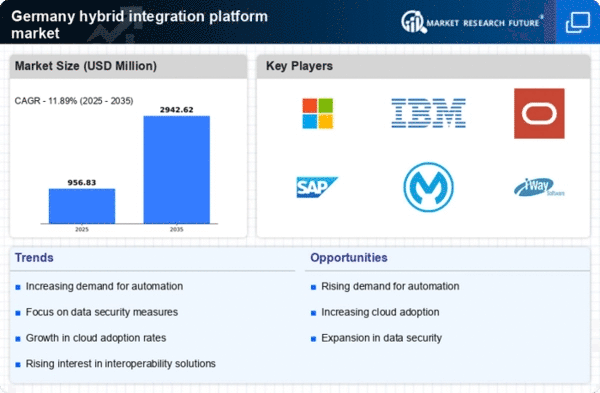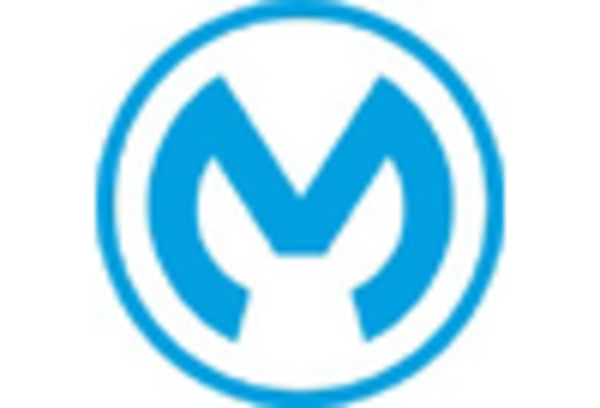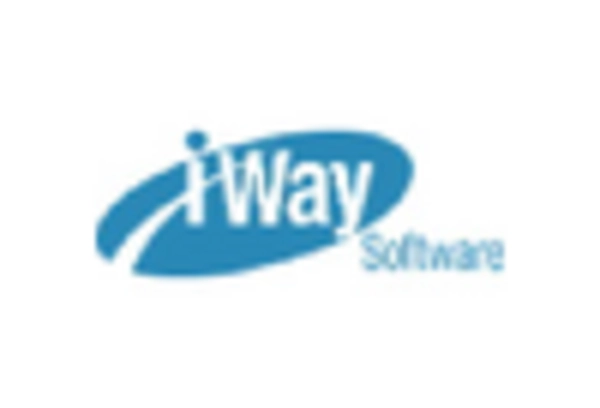Increased Focus on Operational Efficiency
The hybrid integration-platform market is being propelled by organizations in Germany seeking to enhance operational efficiency. Companies are increasingly aware that streamlined processes can lead to significant cost savings and improved productivity. By leveraging hybrid integration platforms, businesses can automate workflows and reduce manual intervention, which is crucial in a competitive landscape. Recent studies indicate that organizations that implement integration solutions can achieve up to a 30% reduction in operational costs. This focus on efficiency is likely to drive further investments in hybrid integration technologies, as companies aim to optimize their operations and respond swiftly to market demands.
Growing Adoption of Digital Transformation
The hybrid integration-platform market in Germany is experiencing a notable surge due to the increasing emphasis on digital transformation across various sectors. Organizations are recognizing the necessity to modernize their IT infrastructure to remain competitive. This shift is reflected in the fact that approximately 70% of German companies have initiated digital transformation projects, which often require robust integration solutions. As businesses strive to connect disparate systems and streamline operations, the demand for hybrid integration platforms is likely to grow. This trend indicates a significant opportunity for vendors in the hybrid integration-platform market to provide solutions that facilitate seamless connectivity and enhance operational efficiency.
Regulatory Compliance and Data Sovereignty
In Germany, stringent regulations regarding data protection and privacy, such as the General Data Protection Regulation (GDPR), are driving the hybrid integration-platform market. Companies are compelled to ensure compliance with these regulations, which often necessitates the integration of various data sources while maintaining data sovereignty. The hybrid integration-platform market is positioned to address these challenges by offering solutions that enable organizations to manage data flows securely and in compliance with local laws. As a result, the market is expected to witness a growth rate of approximately 15% annually, as businesses prioritize compliance and data governance in their integration strategies.
Rise of Remote Work and Collaboration Tools
The shift towards remote work in Germany has created a pressing need for effective collaboration tools, which in turn fuels the hybrid integration-platform market. As organizations adapt to hybrid work models, they require solutions that can integrate various communication and project management tools seamlessly. This integration is essential for maintaining productivity and ensuring that teams can collaborate effectively, regardless of their physical location. The hybrid integration-platform market is expected to benefit from this trend, as companies invest in technologies that facilitate remote collaboration. It is estimated that the market could grow by 20% in the coming years, driven by the demand for integrated solutions that support remote work.
Emergence of Advanced Analytics and AI Integration
The hybrid integration-platform market in Germany is also influenced by the growing interest in advanced analytics and artificial intelligence (AI). Organizations are increasingly looking to harness data for insights and decision-making, which necessitates the integration of various data sources. Hybrid integration platforms can facilitate this by enabling the seamless flow of data between systems, thus supporting analytics initiatives. As businesses recognize the value of data-driven strategies, the demand for integration solutions that can support AI and analytics is likely to rise. This trend suggests a potential growth trajectory for the hybrid integration-platform market, as companies seek to leverage data for competitive advantage.
















